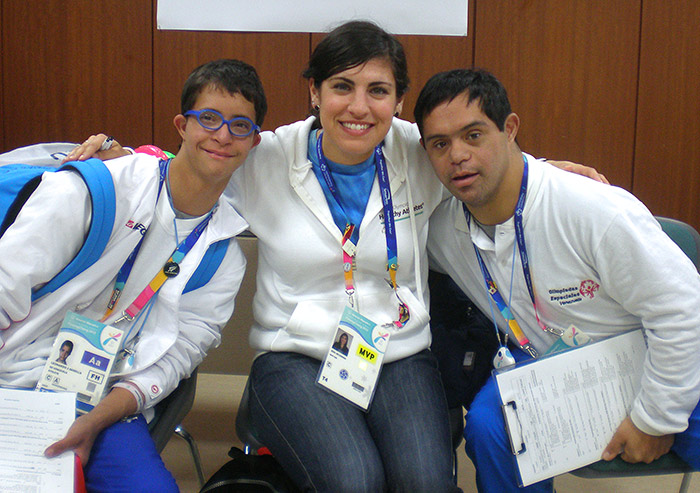
Jodi Seligman, a doctor of audiology student at UT Dallas, volunteered at the Special Olympics World Winter Games in South Korea. "Watching them cheer each other on was the coolest thing," Seligman said.
Last winter, a doctor of audiology student volunteered at the Special Olympics World Winter Games in South Korea, helping to screen more than 800 athletes for hearing-related problems.
Jodi Seligman traveled 13,600 miles to Pyeongchang last February. While there, she helped screen Special Olympic athletes from 107 countries for hearing problems and provided referrals for follow-up care in their home countries. The American Academy of Audiology Foundation and the Student Academy of Audiology sponsored the trip.
According to Seligman, who attends classes at the Callier Center for Communication Disorders, most people don’t realize that other disabilities can occur simultaneously with developmental disorders, such as Down syndrome. This can be because people incorrectly attribute a symptom to the disease.
“Down syndrome, for example, kind of masks other problems,” Seligman said. “People will think that a person can’t communicate well because of cognitive issues or other intellectual disabilities, when really the disease causes anatomical differences, like narrowed ear canals, that lead to hearing loss.”
Because of these treatable but often ignored issues, the Special Olympics, an international organization that provides opportunities for people with intellectual disabilities, began the Healthy Athletes program. Operating since 1997, the program identifies problems in seven health-related areas for follow-up care. Seligman and a student from Vanderbilt University were selected as representatives of the Student Academy of Audiology to help in the Healthy Hearing subprogram.
“Watching the speed skating event was great,” Seligman said. “We only saw a few races, but watching them cheer each other on was the coolest thing.”
But Seligman said her favorite part of the experience was meeting other audiology students from around the world, especially a group from Belgium.
“Learning about them, their culture and how different their educational path was, was really interesting,” Seligman said. “As some of the few people at the event who spoke English, we got to know them really well.”
Seligman continues to impress the audiology community, having recently received the $10,000 William F. Austin Scholarship from Starkey Hearing Technologies, a leading manufacturer of hearing aids, and the 2013 Student Leader Scholarship from the American Academy of Audiology Foundation.